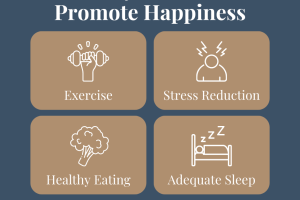The Connection Between Happiness and Healthy Living

What is Happiness?
Happiness is often described as a state of well-being filled with contentment and joy. It’s more than just a fleeting emotion; it reflects a deeper satisfaction with life. Many people equate happiness with achieving goals or acquiring possessions, but it can also be found in everyday moments—like sharing a laugh with friends or enjoying a peaceful sunset. Consider a time when you felt genuinely happy. Perhaps it was during a celebration with your loved ones or a quiet afternoon spent reading your favorite book. These simple moments can quickly become treasured memories that contribute to overall well-being. Happiness can be viewed as a spectrum, where each person’s experience is unique and influenced by a variety of factors, including relationships, purpose, and individual perceptions.
- The Connection Between Happiness and Healthy Living
- What is Happiness?
- What is Healthy Living?
- The Impact of Happiness on Physical Health
- Lowered Risk of Chronic Diseases
- Enhanced Immune System
- The Influence of Happiness on Mental Health
- Reduced Stress Levels
- Improved Cognitive Function
- How Healthy Living Contributes to Happiness
- Balanced Diet and Mood
- Exercise and Mental Well-being
- Strategies for Improving Happiness and Healthy Living
- Mindfulness and Meditation
- Social Connections and Support
- The Role of Sleep in the Happiness-Health Connection
- Importance of Quality Sleep
- Tips for Better Sleep Habits
What is Healthy Living?
Healthy living encompasses more than just diet and exercise; it is a holistic approach to maintaining physical, mental, and emotional health. This includes:
- Nutrition: Eating a balanced diet rich in fruits, vegetables, whole grains, and proteins.
- Physical Activity: Engaging in regular exercise to strengthen the body and boost mood.
- Mental Wellness: Practicing mindfulness, managing stress, and seeking support when needed.
- Sleep Hygiene: Prioritizing quality sleep to restore mind and body.
For example, a person who adopts healthy living habits—such as cooking nutritious meals and taking morning walks—often reports feeling more energized and content. Integrating these practices into daily life not only enhances physical health but also fosters emotional resilience, creating a positive feedback loop with happiness. As we explore the connections between happiness and healthy living, it becomes apparent that nurturing one often nurtures the other, leading to a more fulfilling life.
The Impact of Happiness on Physical Health
Lowered Risk of Chronic Diseases
Happiness plays a crucial role in our physical health, notably in reducing the risk of chronic diseases. Studies have shown that individuals with a positive outlook tend to experience lower rates of conditions such as heart disease, diabetes, and high blood pressure. This connection can be attributed to several factors:
- Reduced Stress Levels: Happiness often correlates with lower stress, which is a significant contributor to chronic illnesses.
- Healthier Lifestyle Choices: Happy individuals are more likely to engage in activities that promote well-being, such as exercising and eating nutritious foods.
- Better Coping Mechanisms: Those who embrace happiness often handle challenges better, reducing the likelihood of turning to unhealthy behaviors.
Take, for example, someone who finds joy in gardening. Not only does this hobby provide a sense of fulfillment, but it also encourages physical activity and fresh produce consumption, ultimately leading to better health.
Enhanced Immune System
The benefits of happiness extend further when it comes to the immune system. Research indicates that individuals who experience positive emotions have stronger immune responses, making them less susceptible to infections and illnesses. Here’s how happiness can enhance your immune system:
- Increased Antibody Production: Happiness can boost the production of antibodies, essential for fighting off illnesses.
- Lower Inflammation: A positive mindset can decrease inflammation in the body, which is linked to numerous health issues.
- Higher Resilience: When faced with health challenges, happier individuals tend to recover more quickly.
Consider someone who practices gratitude daily, reflecting on the positive aspects of their life. This simple act doesn’t just contribute to a joyful mindset; it can also lead to tangible improvements in their immune health and overall well-being. By recognizing the impact of happiness on physical health, individuals can take proactive steps toward nurturing both their emotional and physical selves.
The Influence of Happiness on Mental Health
Reduced Stress Levels
Happiness significantly influences mental health, primarily by lowering stress levels. When individuals cultivate happiness, they often find it easier to navigate life’s challenges without feeling overwhelmed. Stress is known to be a mental health killer, leading to anxiety and depression. Here’s how happiness contributes to stress reduction:
- Positive Reactions: Happy people tend to respond to stressors with optimism rather than fear or anxiety.
- Healthy Coping Strategies: They are more likely to engage in constructive coping mechanisms, such as communication, exercise, or mindfulness practices.
For instance, think about a time when you faced a tight deadline at work. A happy colleague might approach the situation with humor, diffusing tension in the office, while a stressed-out counterpart could spiral into anxiety. This simple difference in outlook can lead to drastically different outcomes when dealing with pressure.
Improved Cognitive Function
Not only does happiness lower stress, but it also enhances cognitive function. Happy individuals often display better concentration, memory retention, and problem-solving skills. Several reasons contribute to this cognitive boost:
- Increased Neurotransmitter Activity: Happiness promotes the release of serotonin and dopamine, which are linked to improved mood and cognitive function.
- Greater Motivation: When people are happy, they are more motivated to engage in mental challenges and learn new skills.
Imagine a student who approaches their studies with enthusiasm versus one who sees it as a chore. The former is likely to absorb the material better, retain information longer, and enjoy the learning process. By prioritizing happiness, individuals can create a positive feedback loop that benefits their mental agility and overall mental health. Continuous happiness fosters a resilient mind ready to tackle challenges with confidence and creativity.
How Healthy Living Contributes to Happiness
Balanced Diet and Mood
Healthy living isn’t just about physical fitness; it plays a vital role in enhancing happiness as well. A well-balanced diet, rich in nutrients, directly influences mood and emotional well-being. The foods we consume affect our brain chemistry and overall energy levels. Here’s how dietary choices can contribute to happiness:
- Nutrient-Rich Foods: Foods high in omega-3 fatty acids (like salmon and walnuts) and antioxidants (found in berries and leafy greens) are known to improve mood.
- Stable Blood Sugar Levels: Meals high in complex carbohydrates can help maintain stable blood sugar, preventing mood swings.
- Hydration: Even mild dehydration can affect mood. Drinking enough water is essential for mental clarity and emotional stability.
For example, think about how a hearty breakfast consisting of whole grains, fruits, and protein feels compared to a sugary pastry. The former not only sustains energy levels but can lead to a more positive outlook throughout the day.
Exercise and Mental Well-being
Another pillar of healthy living that significantly contributes to happiness is exercise. Physical activity releases endorphins, often referred to as “feel-good hormones,” which can elevate mood immediately. Consider these benefits of regular exercise:
- Stress Reduction: Engaging in activities like running or yoga can provide a natural outlet for stress.
- Enhanced Sleep Quality: Regular exercise can lead to better sleep, which is critical for emotional stability.
- Increased Self-esteem: Achieving fitness goals—large or small—can boost confidence and self-image.
Let’s say you went for a brisk walk during your lunch break. Not only do you return reenergized, but you might also find yourself in a better mood, ready to tackle the remaining tasks of the day. By incorporating healthy eating and physical activity into daily routines, individuals can cultivate a happier, more fulfilling life. Healthy living and happiness are intricately linked, creating a cycle that nurtures both emotional and physical well-being.
Strategies for Improving Happiness and Healthy Living
Mindfulness and Meditation
Enhancing happiness and healthy living doesn’t have to be complicated. One effective strategy is practicing mindfulness and meditation. These techniques help individuals cultivate awareness and presence, greatly contributing to emotional well-being.
- Stress Reduction: Mindfulness practices allow individuals to step back from their thoughts and feelings, promoting relaxation and reducing stress.
- Emotional Regulation: Regular meditation can improve emotional resilience, helping people respond better to challenges.
- Improved Focus: Cultivating a mindful approach can lead to sharper concentration, allowing for a more fulfilling daily experience.
For instance, imagine starting your day with just five minutes of mindfulness meditation. Taking the time to breathe deeply and focus solely on the present can set a positive tone for the day. Research indicates that even short daily sessions can lead to long-lasting improvements in mood and outlook.
Social Connections and Support
Another critical strategy for improving happiness and healthy living is fostering social connections and building a support network. Quality relationships can greatly enhance one’s sense of belonging and promote overall well-being.
- Emotional Support: Friends and family provide a safety net during tough times, helping individuals manage stress more effectively.
- Shared Joy: Celebrating achievements and enjoying experiences with others can amplify feelings of happiness.
- Accountability for Healthy Choices: A supportive circle can encourage healthier behaviors, such as exercise and balanced eating.
Consider a time when you shared a meal with loved ones or engaged in a group activity. The laughter and connections formed during these moments can uplift your spirits and contribute significantly to your mood. By prioritizing mindfulness and nurturing social bonds, individuals can create a foundation for lasting happiness and a healthier lifestyle. These strategies not only enhance personal well-being but also foster a sense of community and shared support, enriching both individual lives and the lives of others.
The Role of Sleep in the Happiness-Health Connection
Importance of Quality Sleep
As we’ve explored various strategies for promoting happiness and healthy living, one crucial component often overlooked is the quality of sleep. Sleep is not just a time for our bodies to rest; it is a vital process that fosters emotional and physical well-being. Quality sleep impacts happiness in several ways:
- Mood Regulation: A good night’s sleep helps regulate mood. Poor sleep can lead to irritability and heightened emotional responses.
- Cognitive Function: Sleep plays a critical role in memory consolidation and mental clarity, enhancing our ability to think positively and manage stress.
- Physical Health: Lack of sleep is linked to various health issues, including obesity and heart disease, both of which can impact one’s happiness levels.
For instance, think about how you feel after a restless night. It’s common to wake up feeling cranky, unfocused, and less motivated to engage in activities. Conversely, after a restorative sleep, you may feel renewed and ready to tackle the day.
Tips for Better Sleep Habits
Improving sleep quality is integral to enhancing both physical health and happiness. Here are some practical tips to promote better sleep habits:
- Establish a Routine: Going to bed and waking up at the same time each day regulates your body’s internal clock.
- Create a Sleep-Inducing Environment: Ensure your bedroom is dark, quiet, and cool. Consider using blackout curtains and a white noise machine if needed.
- Limit Screen Time: Reduce exposure to screens at least an hour before bed, as blue light can interfere with the ability to fall asleep.
- Mindfulness Before Sleep: Engage in relaxation techniques such as reading, meditation, or gentle yoga to help calm the mind before bedtime.
By prioritizing quality sleep and implementing these habits, individuals can create a foundation for improved emotional resilience and overall well-being. Recognizing the powerful connection between sleep, happiness, and health enables individuals to take proactive steps toward a more balanced and fulfilling life.





